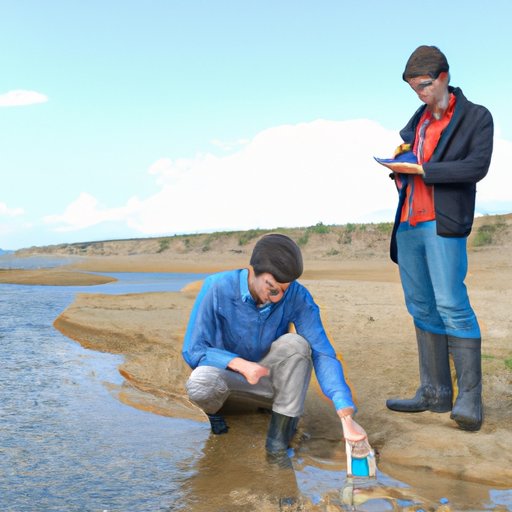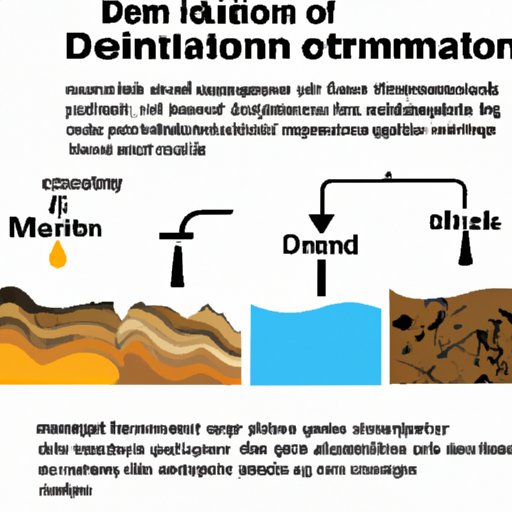Introduction
Sediment is an important part of the Earth’s natural cycles and plays a key role in many different aspects of science. This article will explore what sediment means in science and discuss its formation, types, uses, benefits, impacts on ecosystems, water quality, and human health, influence on climate change, and the role of human activity.
Exploring the Basics of Sediment: What is it and How Does it Form?
Sediment is defined as “loose particles of rock or organic matter that are eroded, transported, and deposited by wind, water, or ice” (Merriam-Webster Dictionary). It can include everything from sand and gravel to clay and silt, and can be found in rivers, lakes, oceans, and other bodies of water.
Sediment forms when rocks and minerals are broken down by weathering and erosion processes. These processes can be caused by a variety of factors, including wind, rain, ice, glaciers, and even human activities such as farming and construction. Over time, these processes break down rocks into smaller and smaller pieces, eventually forming sediment.
A Closer Look at Sediments: Types, Uses, and Benefits
Sediments come in a variety of types, including sand, silt, clay, and organic matter. Sand is the largest particle size, followed by silt, then clay. Organic matter can also form sediment, including dead leaves, twigs, and animal remains.
Sediments have many useful applications in science. For example, they can be used to understand past climates, track the movement of pollutants, study coastal erosion, and even predict earthquakes. In addition, sediments can be used to make concrete and other building materials, and can be used to create artificial habitats for aquatic organisms.
Sediments also provide numerous ecological benefits. They help stabilize shorelines, reduce flooding, filter pollutants from water, provide nutrients to aquatic life, and act as a food source for various animals.
The Role of Sediment in Earth’s Ecosystems
Sediment plays an important role in both aquatic and terrestrial ecosystems. In aquatic ecosystems, sediment acts as a substrate for aquatic organisms, providing them with shelter, food, and oxygen. Sediment can also absorb and remove pollutants from water, helping to improve water quality.
In terrestrial ecosystems, sediment helps to build up soil fertility and improve water retention. It also provides essential nutrients to plants and helps to support biodiversity by providing habitat and food for insects, birds, and other animals.

How Sediment Impacts Water Quality and Human Health
Sediment can have both positive and negative effects on water quality. On one hand, sediment can help to filter out pollutants and improve water clarity. On the other hand, too much sediment can cause turbidity and alter the chemical composition of water, making it less suitable for drinking or swimming.
Excessive sediment in water can also have potential health impacts on humans. Studies have found links between high levels of sediment and increased risk of gastrointestinal illness and skin irritation (Chen et al., 2015). In addition, some sediment particles may contain toxic chemicals, which can pose a risk to human health.

Examining the Influence of Sediment on Climate Change
Sediment can also play an important role in climate change. Sediment can absorb and reflect solar radiation, cooling the Earth’s surface. In addition, sediment can act as a sink for atmospheric carbon dioxide, trapping it in the ocean and preventing it from entering the atmosphere.
However, sediment can also contribute to climate change by releasing greenhouse gases such as methane and nitrous oxide. These gases can trap heat in the atmosphere and lead to higher global temperatures (Liu et al., 2018).
Investigating the Impact of Human Activity on Sediment Deposition
Human activities can have both positive and negative impacts on sediment deposition. Historically, human activities such as deforestation and agricultural practices have led to increased sediment deposition in rivers, lakes, and oceans. This can have negative impacts on water quality, aquatic ecosystems, and human health.
Today, human activities continue to be a major source of sediment deposition. Urban development, mining, and deforestation are all leading causes of sediment pollution. In addition, climate change is causing more frequent and intense storms, which can lead to increased sediment runoff.
Conclusion
Sediment is an important component of the Earth’s natural cycles and has numerous applications in science. It can be used to understand past climates, track the movement of pollutants, study coastal erosion, and even predict earthquakes. In addition, sediment provides numerous ecological benefits, including stabilizing shorelines, reducing flooding, filtering pollutants from water, and providing nutrients to aquatic life. However, excessive sediment can also have negative impacts on water quality, aquatic ecosystems, and human health.
Sediment can also contribute to climate change by absorbing and reflecting solar radiation and by releasing greenhouse gases. Finally, human activities such as urban development, mining, and deforestation are major sources of sediment pollution. To reduce the impacts of sediment on the environment, it is important to limit human activities that cause sediment pollution and to take steps to improve water quality.
In conclusion, sediment is an important part of the Earth’s natural cycles, and understanding its formation, types, uses, benefits, and impacts is essential for protecting the environment and human health.
(Note: Is this article not meeting your expectations? Do you have knowledge or insights to share? Unlock new opportunities and expand your reach by joining our authors team. Click Registration to join us and share your expertise with our readers.)
